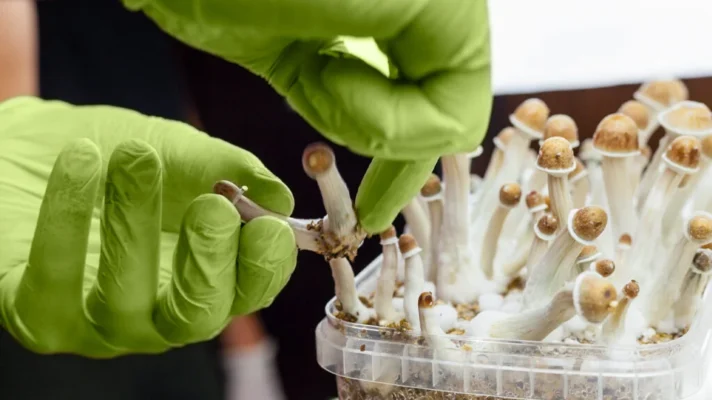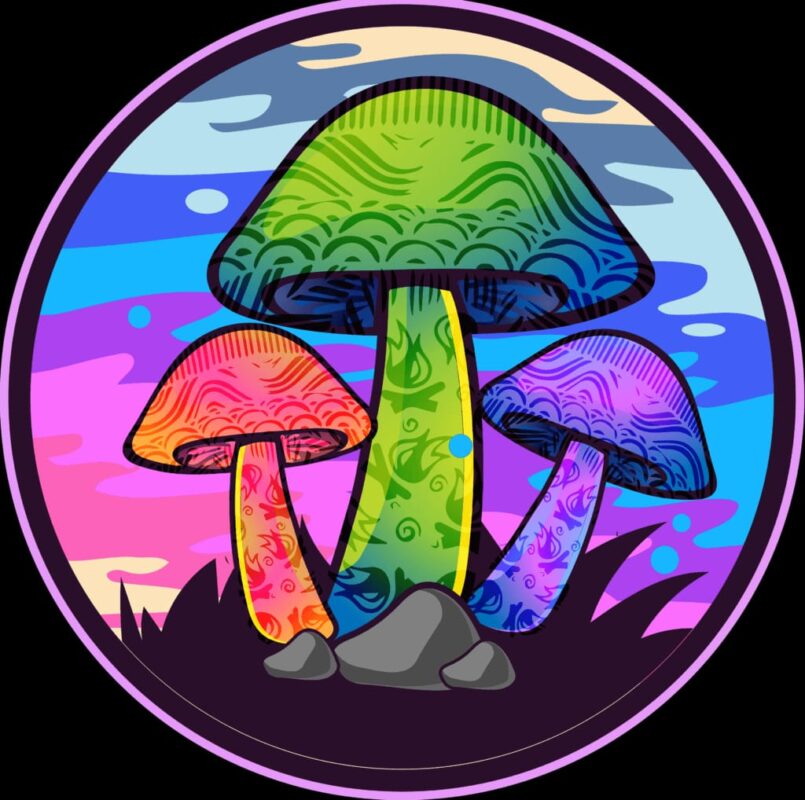Blog
The Healing Power of Magic Mushroom Therapy: A Comprehensive Guide
Introducing Magic mushroom therapy
Psilocybin-assisted treatment, or magic mushroom therapy, has gained recognition as a ground-breaking method for treating mental health conditions and promoting personal development. We’ll examine the life-changing potential of magic mushroom therapy in this thorough guide, offering details on its background, effects, and current research as well as useful considerations. This guide attempts to provide useful information and tools for anyone interested in alternative approaches to mental wellness or in learning more about the science underlying magic mushrooms.
The Background of Magic Mushroom Treatment:
First of all, magic mushrooms have been a part of traditional healing and spiritual rites for generations. Researchers and therapists alike are interested in them because of their substantial impact on consciousness and perception. We can comprehend the cultural and spiritual significance of these potent mushrooms better by exploring the historical background of mushroom therapy.
Understanding the Therapeutic Effects Of Magic mushroom therapy:
The primary ingredient in magic mushrooms, psilocybin, has been demonstrated to cause significant alterations in consciousness that result in self-reflection, emotional release, and spiritual experiences. The therapeutic effects of psilocybin will be discussed in this section, along with how it may be able to lessen addiction, PTSD, anxiety, and depressive symptoms. Readers can learn more about the therapeutic value of magic mushrooms by learning how they can aid in psychological healing.
Present-day Studies and Clinical Trials:
The therapeutic potential of magic mushrooms has garnered renewed scientific study in recent times. Psilocybin-assisted therapy is becoming more widely acknowledged as a valid strategy for promoting mental wellness as a consequence of clinical trials showing encouraging outcomes in the treatment of a range of mental health issues. An outline of current clinical studies and research findings will be given in this section, emphasizing how magic mushroom therapy has the potential to completely transform mental health services, shop here.
Navigating Legal and Ethical Considerations:
Furthermore, the ethical and legal context of magic mushroom therapy is complicated and differs depending on the country. Although some areas have accepted psilocybin’s medicinal potential, others have tight laws against its usage. The present regulatory landscape and prospects for future advancements in this area can be better understood by readers by offering insights into the moral and legal issues surrounding magic mushroom therapy.
Integrity and Safety in Magic Mushroom Therapy
When thinking about using magic mushrooms for therapy, safety and integration are crucial. Additionally, this part will provide helpful advice on how to approach psilocybin-assisted therapy in a responsible manner, covering topics like dose, setup, and integrating psychedelic experiences. Through encouraging a safety-conscious and thoughtful culture, we can guarantee that people approach magic mushroom therapy with awareness and respect, shop here.
Final Thoughts Regarding Magic Mushroom Therapy
Furthermore, by providing a comprehensive and transformative approach to recovery, magic mushroom therapy offers a paradigm change in the treatment of mental health illnesses. With an examination of its background, therapeutic benefits, ongoing studies, and practical implications, this guide seeks to offer a thorough resource for those curious about magic mushroom therapy. The great potential of magic mushroom treatment inspires us to accept new opportunities for healing and personal development, regardless of whether we are therapists, researchers, or individuals looking for alternative ways to mental wellbeing.
**The Magic Mushroom Therapy’s Healing Potential**
Psilocybin-assisted treatment, or magic mushroom therapy, has attracted a lot of attention due to its ground-breaking ability to treat mental health conditions and promote personal development. Psilocybin, the hallucinogenic ingredient in magic mushrooms, has been used therapeutically for many years. This research has revealed the extraordinary healing effects and transforming potential of psilocybin.
Revolutionary Healing Potential For Magic mushroom therapy
– The hallucinogenic ingredient in magic mushrooms, psilocybin, has become the most researched psychedelic, showing promise for the treatment of a wide range of mental illnesses.
– Psilocybin therapy has been found to be helpful in treating symptoms of depression that is resistant to treatment, obsessive-compulsive disorder, and other mental health conditions.
Research has also demonstrated that psilocybin has a wide range of therapeutic uses by reducing anxiety and panic in patients who are nearing the end of their lives , shop here.
**Organised Assistance and Supervision** – It is important to realize that using psilocybin unsupervised carries dangers, including the possibility of negative side effects.
– Trained therapists and clinicians provide participants with structured support, monitoring, and follow-up care in a controll study environment, therefore safely and effectively lowering the associate risks.
Benefits of Magic Mushroom Therapy for Depression
Particularly for those who don’t react to conventional antidepressant drugs, magic mushroom therapy—which mostly uses the active ingredient psilocybin—has become a viable alternative for treating depression. The following are some main advantages of this creative strategy:
1. Rapid Relief from Symptoms
The speed at which magic mushroom therapy can reduce depressed symptoms is one of its biggest benefits. According to research, individuals frequently see significant improvements in their depression levels soon after receiving treatment. For example, one study found that after taking psilocybin, individuals’ mood and general mental health improved quickly, with effects that lasted for months.
2. Long-lasting Effects
Psilocybin therapy has the potential to produce long-lasting benefits, in contrast to traditional antidepressants that may need daily dosage and take weeks to start working. After only a few sessions, participants in certain studies experienced long-lasting decreases in anxiety and depression for as long as six months. Those who suffer from persistent depression may find their quality of life much improved by this long-lasting benefit.
3. Enhanced Emotional Processing
Psilocybin seems to promote increased emotional processing and openness, enabling people to face and resolve underlying problems that are causing their depression. During sessions, which are frequently led by qualified professionals, this therapeutic component can result in significant revelations and emotional breakthroughs.
4. Potential for Reducing Anxiety and Existential Distress
Additionally, magic mushroom therapy has demonstrated promise in treating existential discomfort and anxiety, especially in patients with terminal conditions. According to studies, psilocybin can assist people in accepting their mortality, which can improve their attitudes toward dying and lessen their fear about life-threatening illnesses.
5. Alternative for Treatment-Resistant Depression
Magic mushroom therapy presents a viable option for individuals who have not experienced alleviation from conventional antidepressant treatments. Millions of people who suffer from treatment-resistant depression may have hope as clinical trials investigate the effectiveness of psilocybin in treating depression when other therapies have failed.
6. Supportive Therapeutic Environment
The effectiveness of psilocybin therapy is increased when it is combined with supportive psychotherapy. Sessions are frequently held in a safe, encouraging setting, which can assist participants in navigating their experiences and incorporating new information learned throughout therapy.
Safety Considerations for Magic Mushroom Therapy
Addressing the safety concerns related to magic mushroom therapy is essential since interest in this method, especially the use of psilocybin for mental health treatment, keeps growing. Here are some important things to remember:
1. Contraindications and Pre-existing Conditions
People should be evaluated for any pre-existing mental health issues prior to receiving magic mushroom therapy. People who have experienced severe anxiety problems, schizophrenia, or psychosis in the past may be more susceptible to negative effects. It is crucial to speak with a trained medical expert who can evaluate each patient’s risks and decide whether psilocybin therapy is suitable.
2. Adverse Effects
There may be negative repercussions even though many people report having great experiences with psilocybin. In the short term, nausea, anxiety, and confusion are common side effects. People occasionally have unpleasant travel experiences that are marked by extreme paranoia or fear. These hazards can be reduced and support can be given in the event that unpleasant experiences occur if a qualified therapist or guide is present during the session.
3. Drug Interactions
Many drugs, especially those that alter serotonin levels, such selective serotonin reuptake inhibitors (SSRIs), can interact with psilocybin. Serotonin syndrome, a potentially fatal illness, can result from these interactions. Before beginning therapy, people must tell their healthcare professional about all of the medications they are taking.
4. Setting and Support
The safety and efficacy of psilocybin therapy are greatly influenced by the environment in which it takes place. A positive therapeutic experience can be facilitated by a safe, cozy setting with helpful staff. After the session, participants should be able to process their experiences and new perspectives through integration therapy.
5. Legal and Ethical Considerations
People should be informed of the rules that govern the use of psilocybin in their location, as the legal status of this drug differs by region. Participant protection and adherence to safety procedures are guaranteed when therapy is conducted within a legal framework. Assuring informed permission and giving sufficient information about potential hazards and benefits are additional ethical considerations.
6. Monitoring and Follow-Up
Magic mushroom treatment requires constant observation and follow-up care. Mental health specialists who can offer assistance and handle any issues that could surface following therapy sessions should be available to participants. By following up, people may make sure they are successfully integrating their experiences and dealing with any aftereffects.
Exciting Research Results For Magic mushroom therapy
– Psilocybin research has become more well-known in the fields of psychiatry and psychology, as studies into its potential therapeutic uses for mental health issues like anxiety, depression, and post-traumatic stress disorder (PTSD) continue.
– The importance of continuing study in this area is highlighted by the United States Food and Drug Administration’s (FDA) breakthrough therapy designation, which will enable additional research on psilocybin in the potential treatment of depressive illnesses.
**Long-Lasting Benefits**: Psilocybin-treat patients have reported feeling better a year later, demonstrating the magic mushroom therapy’s enduring benefits.
– Psilocybin therapy has demonstrate potential in “rebooting” the brain in depressed patients, presenting a promising avenue for long-term depression treatment.
**The Significance of Ongoing Investigation**
– Research on the therapeutic effects and mechanisms of action of psilocybin is crucial, as its use in psychedelic-assist mental health therapy gains traction in scientific circles.
– To fully realize the benefits of magic mushroom therapy and broaden its use in treating challenging mental health issues, more research is necessary.
In summary, mushroom therapy is significant because it has the potential to completely improve mental health treatment by providing a comprehensive and revolutionary method of recovery. Psilocybin’s healing potential and therapeutic applications warrant further investigation due to its promising research findings, long-lasting effects, and ongoing need.

